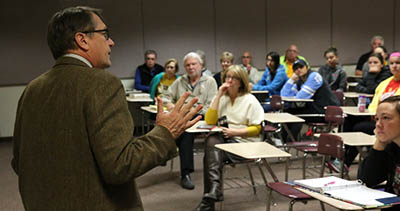
By RANDY GONZALES
FHSU University Relations and Marketing
A self-described “bunch of old guys” brought Dr. Edward Larson to Hays, America last week.
Larson, a Pulitzer Prize-winning historian, best-selling author and history professor at Pepperdine University in California, was the speaker at Wednesday’s Keith Sebelius Lecture Series at Fort Hays State University. Larson also spent Thursday and Friday on campus, talking to FHSU students on a variety of topics. He came to Hays through the efforts of a local informal group of retired men.
Five men who go to the same church have met on Wednesday mornings for the past two years to discuss topics of interest. It might be politics, or history, or science, or religion. The group watched one of Larson’s presentations at one of their meetings, and they got in touch with him afterward.
“They contacted me out of the blue,” Larson said. “They asked me to respond to several questions from one of the things I had done before.”
That led to a Skype session with Larson, and an invitation to come to Hays.
“We were so impressed with his range of knowledge of history, law, biology and political science,” said Armin Kelly, a group member and retired veterinarian who lives in Plainville. “We wanted to have a discussion with him.”
The group helped coordinate a series of lectures on campus and had the idea Larson would be a good candidate for the Sebelius Lecture Series. Kelly said FHSU officials agreed.
“With their help and our support, we got him to come to the Sebelius lecture and to talk to students on campus,” Kelly said. “I consider it a success. Some of the guys worked pretty hard to get this done.”
Larson said he was impressed with what he saw at FHSU.
“It seems to be a place on the move,” Larson said. “When you’ve got so many other places you go, they’re in retreat.”
After giving a lecture on the origin of politics as part of the Sebelius Lecture Series on Wednesday night, Larson gave lectures on campus Thursday about the creation-evolution debate, about human evolution and a question-and-answer session about elections and the origin of politics. That evening, Larson lectured at the Hays Public Library about science and religion. On Friday, Larson gave a lecture on George Washington and the Constitution, followed by another question-and-answer session.
“It’s fun,” Larson said. “I like teaching. It’s fun to come in and talk with classes. The students get a chance to see you more than once.”
A hot topic was the current presidential election. Pundits who think this is the worst election cycle ever don’t have a sense of history, according to Larson.
“As a historian, you roll your eyes,” he said.
Larson pointed to other presidential elections where the parties got down and dirty, most notably the 1800 campaign, when Thomas Jefferson defeated John Adams.
“We’ve had them this partisan in the past,” Larson said.
Larson thinks this election is the most partisan since the 1964 battle between President Lyndon Johnson and Republican challenger Barry Goldwater. Like 1964, Republicans and Democrats both worry about what will happen if the other party wins Tuesday.
“Both sides honestly fear that catastrophe lies ahead if the other person’s elected,” Larson said. “That’s what people thought in 1964.
“People didn’t feel that way in Bush vs. Gore,” he added. “People didn’t feel that way in Romney vs. Obama. Sure, there was negative campaigning, but it wasn’t the same.”
Larson said the winner of this election can learn a lesson from Jefferson after he won a bitter contest 216 years ago.
“What we learned from Jefferson — and what we’re going to seek — is when Jefferson did become president after a catastrophe of an election, he realized it was a catastrophe,” Larson said. “Being a statesman, he reached out to the losing party even though they had no faith in him.
“The question is, does either candidate — if they win — have the fortitude, courage and the sense of America to be like Jefferson was? That, we don’t know yet.”
